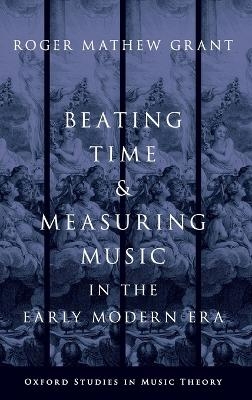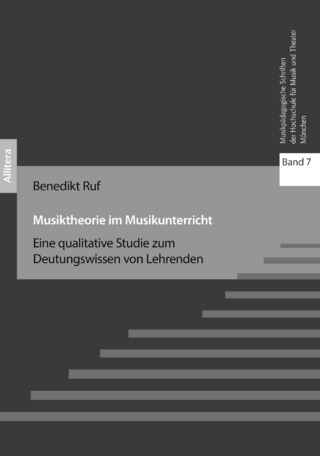
Beating Time and Measuring Music in the Early Modern Era
Oxford University Press Inc (Verlag)
978-0-19-936728-3 (ISBN)
Beating Time and Measuring Music in the Early Modern Era chronicles the shifting relationships between ideas about time in music and science from the sixteenth through the early nineteenth centuries. Centered on theories of musical meter, the book investigates the interdependence between theories of meter and conceptualizations of time from the age of Zarlino to the invention of the metronome. These formulations have evolved throughout the history of Western music, reflecting fundamental reevaluations not only of music but also of time itself. Drawing on paradigms from the history of science and technology and the history of philosophy, author Roger Mathew Grant illustrates ways in which theories of meter and time, informed by one another, have manifested themselves in the field of music.
During the long eighteenth century, treatises on subjects such as aesthetics, music theory, mathematics, and natural philosophy began to reflect an understanding of time as an absolute quantity, independent of events. This gradual but conclusive change had a profound impact on the network of ideas connecting time, meter, character, and tempo. Investigating the impacts of this change, Grant explores the timekeeping techniques - musical and otherwise - that implemented this conceptual shift, both technologically and materially.
Bringing together diverse strands of thought in a broader intellectual history of temporality, Grant's study fills an unexpected yet conspicuous gap in the history of music theory, and is essential reading for music theorists and composers as well as historical musicologists and practitioners of historically informed performance.
Roger Mathew Grant is Assistant Professor of Music at Wesleyan University. A recent graduate of the University of Pennsylvania (PhD 2010) his research focuses on the relationships between eighteenth-century music theory, Enlightenment aesthetics, and early modern science. His journal articles have appeared in Music Theory Spectrum, Eighteenth-Century Music, and the Journal of Music Theory. A former Junior Fellow of the University of Michigan's Society of Fellows, he was the fourth musicologist ever to hold a fellowship in the forty-year history of the Society.
Table of Contents ; Acknowledgements ; Introduction ; A History of Meter Theory, Or, the Rules of the Rules ; Reading in the Dark ; Part I ; 1. Beating Time ; Themes in Meter Theory, 1500-1700 ; The Theoretical Work of the Beat ; The Organizing Principle of Meter Theory: Four Approaches ; <"Honor Them All>": On the Use (and Misuse?) of Meter Theory ; 2. The Beat: A Technical History ; A Technical and Physical Solution ; A Problem of Continuity ; The Techn? of the Beat. ; Re-reading Zarlino ; 3. A Renewed Account of Unequal Triple Meter ; Equality ; Inequality ; Part II ; 4. Measuring Music ; Meter, Measure, and Motion in Eighteenth-Century Music Theory ; A Transformation in Time ; A Multiplicity of Measures ; Kirnberger's Contribution ; 5. Techniques for Keeping Time ; The Problem of Tempo ; Timekeeping Two Ways: 1. Chronometers ; Timekeeping Two Ways: 2. Taxonomies of Meter ; 6. The Eighteenth-Century Alla Breve ; A Rather Vague Indication ; Long-Note Music in the Eighteenth Century ; Long Notes in Eighteenth-Century Music ; Part III ; 7. The Reinvention of Tempo ; A New Chronometer? ; Meter, Tempo, Number ; Length Into Duration, Duration Into Length: A Crisis of Measures ; Maelzel's Metronome ; 8. The Persistent Question of Meter ; The Measure as Mystery ; Meter as Attention, Activity, Aesthesis ; Fetis and the Future ; Appendices ; Bibliography
| Erscheint lt. Verlag | 8.1.2015 |
|---|---|
| Reihe/Serie | Oxford Studies in Music Theory |
| Zusatzinfo | 36 music examples; 30 plates |
| Verlagsort | New York |
| Sprache | englisch |
| Maße | 236 x 163 mm |
| Gewicht | 626 g |
| Themenwelt | Kunst / Musik / Theater ► Musik ► Musiktheorie / Musiklehre |
| ISBN-10 | 0-19-936728-0 / 0199367280 |
| ISBN-13 | 978-0-19-936728-3 / 9780199367283 |
| Zustand | Neuware |
| Haben Sie eine Frage zum Produkt? |
aus dem Bereich


